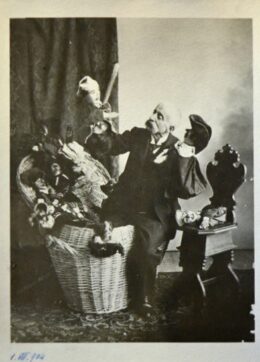Printed summary
13 pages
Author(s)
Maria la bresciana e Luigi Gambara con Faggiolino detto il bravo della Lombardia
The cover of the manuscript is signed by Angelo Cuccoli. On the third page, the author gives information on the first performance and talks about a “shortened adaptation using glove-puppets”. In fact, the text is a summary of the historical drama Brescia e Venezia ossia Luigi Gambara e Maria da Brescia nelle carceri del Ponte dei Sospiri in Venezia (Brescia and Venice or Luigi Gambara and Maria da Brescia in the prisons of the Bridge of Sighs in Venice), an anonymous theatrical text published in 1868 in Milan; it largely inspired puppeteers from Northern Italy. It should be noted that the first printed version of this historical drama postdates Cuccoli’s manuscript, suggesting that he was inspired by a performance of this play rather than a printed text.
Angelo Cuccoli’s manuscript is a long summary without any dialogues. It was adapted by the historian and librarian Albano Sorbelli (1875-1944) in the journal L’Archiginnasio. It also includes information on the performance: “Shortened adaptation by Angelo Cuccoli for glove-puppets performed for the first time in collaboration with his father and Andrea Ludergnani (mask of Giupin) on the Piazza Vittorio Emanuele II on the evening of July 12, 1865; for the second time on the Piazza De Marchi on August 7, 1882 with Augusto Galli”. The Piazza Vittorio Emanuele II is the current Piazza Maggiore in Bologna. For a long time, the Cuccoli family performed with their hand-puppet booth under the arcades of the Palazzo del Podestà which stands on the Piazza Maggiore.
The persecution of a villain against a happy couple
Luigi Gambara and Maria da Brescia are happily married. The villain Alvise takes advantage of Luigi’s absence to try and seduce Maria. Faggiolino, the servant in Luigi’s house, notices the situation, and when Luigi comes back, he warns him. Luigi discovers Alvise in his wife Maria’s bedroom as he is talking to her about love. Alvise challenges him to a duel, but he is wounded and flees, promising to take revenge. After making sure of Maria’s innocence, Luigi decides to take her far away from Brescia, so that she can find protection in Venice. Alvise gets ahead of them and goes to meet the Inquisitor to accuse Luigi of wanting to commit an attack against the Venetian Republic. Luigi is imprisoned and sentenced to death, but his servant Faggiolino provides him with the necessary money to bribe the guard Brighella; he then waits for him in a gondola under the Bridge of Sighs to help him escape. Luigi takes revenge on Alvise and kills him. As he is about to kill Maria, his daughter arrives and prevents him from doing so.
First performance
Arcades of the Palazzo del Podestà, Piazza Vittorio Emanuele II (now Piazza Maggiore), 12 July 1865
Publications and translations
Albano Sorbelli, Angelo Cuccoli e le sue commedie, in L’Archiginnasio, IV, 6, 1909, p. 217-240.
Antonio Pandolfini Barberi, Burattini e burattinai bolognesi. Bologna: Forni, 1983.
Roberto Leydi, Renata Mezzanotte Leydi, Burattini e Marionette. Milano: Collana del Gallo Grande, 1958.
